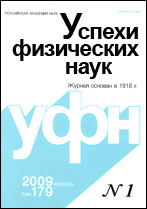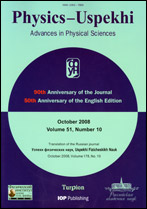|
This article is cited in 192 scientific papers (total in 193 papers)
REVIEWS OF TOPICAL PROBLEMS
Straintronics: a new trend in micro- and nanoelectronics and materials science
A. A. Bukharaeva, A. K. Zvezdinbcd, A. P. Pyatakove, Yu. K. Fetisovf
a Zavoisky Kazan Physicotechnical Institute, Federal Research Center "Kazan Scientific Centre of the Russian Academy of Sciences"
b Prokhorov General Physics Institute, Russian Academy of Sciences, Moscow
c Lebedev Physical Institute, Russian Academy of Sciences, Moscow
d Moscow Institute of Physics and Technology (State University), Dolgoprudny, Moscow region
e Faculty of Physics, Lomonosov Moscow State University
f MIREA — Russian Technological University,
Abstract:
The term ‘straintronics’ refers to a new research area in condensed matter physics, in which strain engineering methods and strain-induced physical effects in solids are used to develop next-generation devices for information, sensor, and energy-saving technologies. This paper reviews the basic ideas of straintronics, examines the underlying effects, highlights its advantages over conventional electronics, and identifies the problems it faces and fundamental constraints it is subject to. Special attention is given to the straintronics of magnetic and magnetoelectric materials as the most promising area for radically reducing computational energy consumption. Specific examples are presented of how the principles of straintronics are applied practically in information and energy-saving technologies, as well as in sensor and microwave engineering.
Received: September 6, 2017
Revised: January 15, 2018
Accepted: January 16, 2018
Citation:
A. A. Bukharaev, A. K. Zvezdin, A. P. Pyatakov, Yu. K. Fetisov, “Straintronics: a new trend in micro- and nanoelectronics and materials science”, UFN, 188:12 (2018), 1288–1330; Phys. Usp., 61:12 (2018), 1175–1212
Linking options:
https://www.mathnet.ru/eng/ufn6120 https://www.mathnet.ru/eng/ufn/v188/i12/p1288
|


| Statistics & downloads: |
| Abstract page: | 665 | | Full-text PDF : | 76 | | First page: | 38 |
|



 Contact us:
Contact us: Terms of Use
Terms of Use
 Registration to the website
Registration to the website Logotypes
Logotypes